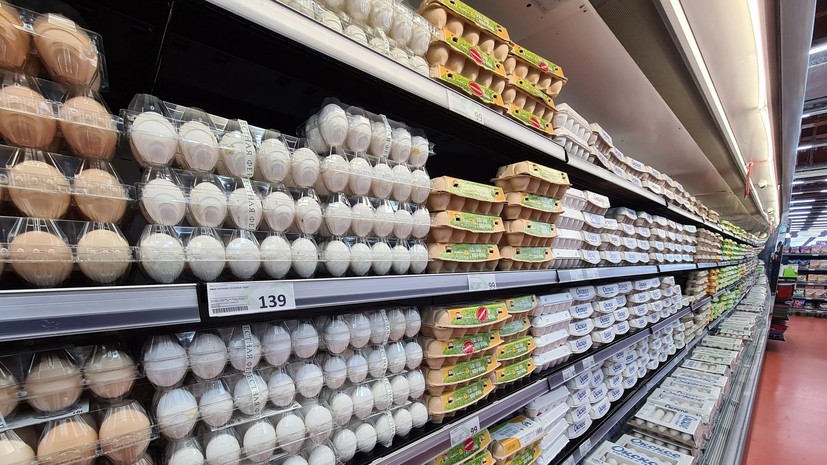In January 2024, chicken eggs on the shelves of Russian stores fell in price by an average of 1.81% compared to December. At the same time, since the beginning of this month, prices have dropped by another 0.47%. Such data was presented on Wednesday, February 14, by the Federal State Statistics Service.
“Today, a dozen eggs retail on average in Russia for about 129 rubles, although at the beginning of January the value exceeded 133 rubles. Eggs really continue to get cheaper. This is a sign that an equilibrium point of supply and demand has been found and the situation is stabilizing,” Dmitry Leonov, deputy chairman of the board of the Rusprodsoyuz association, told RT.
Let us remind you that chicken eggs in Russia have become noticeably more expensive since July 2023, and based on the results of the entire last year, their average cost increased by more than 62% - from 81.7 to 132.5 rubles per dozen. The achieved rate of price growth was more than eight times higher than inflation (7.4%), according to materials from the Ministry of Economic Development.
One of the main reasons for this situation was the emergence of an imbalance between supply and demand in the egg market in Russia. The Central Bank came to this conclusion.
According to a Central Bank study, the country's production growth slowed in 2023 as some large enterprises faced bird flu outbreaks and were forced to destroy some of their products. At the same time, against the backdrop of sanctions, supplies of hatching eggs to Russia from abroad have decreased, which also complicated the work of a number of poultry farms.
Meanwhile, domestic consumption of goods, on the contrary, began to grow at an accelerated pace. For example, healthcare companies began purchasing eggs in large quantities for vaccine production after the withdrawal of European and American pharmaceutical companies from the country.
At the same time, there was an increased demand for the product from ordinary Russians, says Sergei Yushin, head of the executive committee of the National Meat Association. According to him, due to the increase in real incomes, people more actively consumed chicken and purchased eggs in record volumes - the most affordable source of protein.
“Another reason for the rise in prices is the creation of a stir in the media, as a result of which some categories of citizens began to buy eggs in reserve and an artificial shortage formed on the market. In addition, some egg producers have repurposed their capacities for broiler production,” added RT’s interlocutor.
Also, according to Central Bank analysts, a sharp price jump could be triggered by fluctuations in exchange rates: the weakening of the ruble in the third quarter of 2023 led to an increase in the cost of feed additives, the production of which is 75-85% dependent on imported components. In addition, some poultry farms have increased logistics costs, and a number of enterprises are faced with a shortage of personnel, which also affects the final cost of the product.
AGN "Moscow"
It was not possible to prevent the rise in egg prices in 2023, because the government did not respond to the situation in time and “did not open imports.” President Vladimir Putin announced this on December 14, answering questions from citizens during a direct line combined with a large press conference.
“I talked to the Minister of Agriculture and asked how he was doing with his eggs. They say everything is fine with them. To which I noted to him (I tell him honestly): “But our citizens have problems: rising (prices -
RT
)”... Therefore, I regret and apologize in this regard. This is a failure in the work of the government... The situation will be corrected in the near future,” Putin promised.
Market balance
After the head of state’s remarks, the Ministry of Agriculture began to work on a whole range of measures to eliminate the problem. In particular, the authorities decided to eliminate import duties and increase supplies from friendly countries, as well as increase their own production and transfer poultry farms with distribution networks to long-term contracts to ensure projected volumes and stable prices.
In addition, as Sergei Yushin noted, after the New Year, the consumer rush on the market subsided, which also began to have a positive effect on the cost of chicken eggs. According to the expert, a new wave of increased demand can be seen before Easter, but by this time the industry will be fully able to satisfy the needs of the market at the expense of its own capacities.
RIA News
© Alexander Kryazhev
“In general, we have good forecasts for the increase in egg production for the current year, as business has begun to invest more actively in the development of the industry. In addition, those factories that were affected by epidemics in 2023 should also enter the market with new volumes of products,” Yushin added.
According to his assessment, it has now been possible to reach an equilibrium level of supply and demand: there is no shortage in the market, but there is also no overstocking. Under these conditions, there will probably not be a significant drop in prices this year, but there will also not be a sharp increase, as was the case in 2023, if biological safety can be ensured at poultry farms. At the same time, the cost of eggs will largely depend on the dynamics of production costs of enterprises, says Dmitry Leonov.
“However, it is worth noting that even with equal and even higher costs with other countries, prices for eggs in Russia still remain one of the lowest in the world. Thus, as of January 2024, the average world price was $2.92 (about 267 rubles. -
RT
) for 12 pieces, and the maximum level was recorded in New Zealand - $6.88 (629 rubles. -
RT
). In total, out of more than 80 countries, eggs were cheaper than in Russia, but only five countries had eggs,” Leonov noted.

